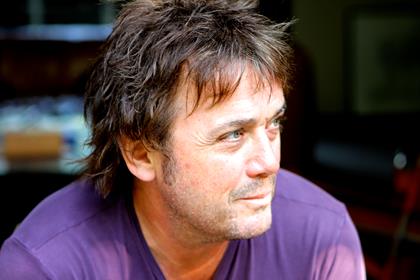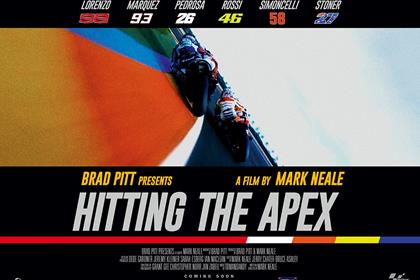Exclusive Interview: Mark Neale, Hitting The Apex
No other racing filmmaker has quite managed to get under the skin of the premier class like Mark Neale, the man behind Faster, Fastest, and now Hitting The Apex. The British filmmaker has an engaging ability to strip away everything that can cloud top-flight racing, and deliver you the very essence of MotoGP. It’s an emotional ride, too. The highs are exalted, the lows – most notably the loss of Marco Simoncelli – are uncomfortable to relive. Neale’s ability to capture everything that makes us fans, all presented and narrated by GP-superfan Brad Pitt’s mesmerising drawl, sucks you in and spits you out the other end convinced that there is no better race series on Earth.
As Pitt eulogises: “This is a story of what is at stake for all of them. All that can be won and all that can be lost when you go chasing glory at over 200mph on a motorcycle.”
Hitting the Apex follows the high-octane fight for world domination amongst six of the fastest racers of all time: Valentino Rossi, Jorge Lorenzo, Marco Simoncelli, Marc Marquez and Dani Pedrosa. But what makes them so special?
MARK NEALE: These six guys are the top racers. With the exception of Marco Simoncelli they are the men who have won World Championships since 2006. Although to be honest, I don’t think they particularly cared about being in the film. Casey Stoner told me to my face that he thought Fastest was terrible, seriously. But that’s just because he’s not a Rossi fan.
MCN: How does Marco Simoncelli fit into this film?
MN: There’s the epic story which traces the arc of Rossi’s failure and the beginnings of his revival, entwined with the arrival of Marc Marquez. So we have the overlap of two eras and in the middle of that incredible combination is the tragedy of Marco. His death was an enormous factor and I knew this film would have to be done right because of him.
MCN: Was it easy to follow Faster and Fastest?
MN: I wanted to make a better film than the last two by offering a real sense of what the rider’s lives are like – and not just what they do, but what it’s like for the people around them. But it’s not really a question of what I wanted to do, it’s a question of how you tell these stories, and can you do it well enough given the difficulties.
MCN: What were those difficulties?
MN: Everything! It was absolute murder. You have very little access to the riders in a sport controlled by big corporations. And your biggest enemies are time and money. You’ve got to get Dorna to agree to let you do it in the first place, and that’s very, very hard. I have a good relationship with them, but there are so many other people competing to make films. A large part of your budget is a Dorna rights fee. And then you’ve got to find funds to actually make the film. I started talking to Dorna in 2011, on the day Fastest came out – and it’s taken until now to finish Hitting The Apex.
MCN: Was money a serious issue?
MN: A massive factor, I didn’t have enough money to make it. I had to pay for the film on my credit cards for several months. The project actually died twice. The first time was when my cards stopped working in August 2013. American Express called and said ‘Stop Mark – you’re going crazy’. That’s when I thought my chances of completing it were 50/50. But I managed to get a deal with Universal that gave us a cash injection. It’s a labour of love and a labour of madness. There was nothing left of me by the end and, honestly, I’m not sure I could do it all again.
MCN: So what pushed you to persevere?
MN: I set out to do just justice to these people – Marco Simoncelli in particular – and I wasn’t happy rushing it and making something crap. I wanted to take my time and get it right. That was my motivation; not settling for something that’s not as good as it could be. To have an opportunity to make a film like this and spend the rest of my life thinking ‘Oh god, I didn’t do a good job’ would be a tragedy. I’m a fan of the sport, first and last – and I genuinely wanted to do justice to it.
MCN: Brad Pitt takes over from Ewan McGregor in this film, did that help with financing?
MN: Ewan did a fantastic job and his promotion was invaluable. But I had to find a way to make this film, and Brad is a producer with his own production company. He brought more money and we could take the film to a higher standard with more time to edit – something only a producer can help with. And he’s a really talented filmmaker, with a huge love of the sport. He’d spend all day in the edit with me and gave us what we needed to finish the film to the level we wanted.
MCN: What’s next?
MN: There are always stories to tell, and the great one right now is what Rossi is doing. I would like to do another, but these things are always so uncertain and I just hope I could do it under different conditions.
MCN: Do you see this labour of love as a success?
MN: Generally, if you launch yourself into something like this somebody will help. But there were some very long and dark nights. This one was particularly crazy, it was hell. It’s madness to embark on something not knowing if you can finish it, but I honestly believed it would work out, and I guess that’s a bit crazy too. But in the end, we actually did what we set out to do and I am very, very proud of it.
Hitting The Apex will premiere at the British GP at Silverstone this Friday, ahead of being released in cinemas from September 2, featuring a Q&A with director Mark Neale, and on Blu-ray, DVD and Digital HD on September 7.




